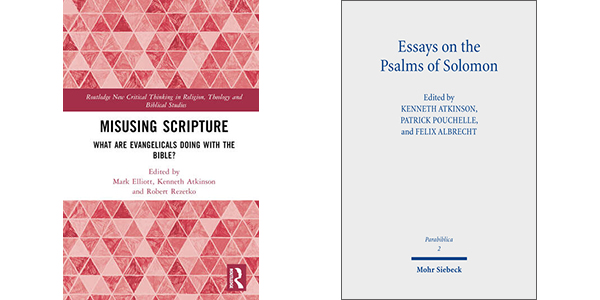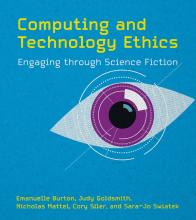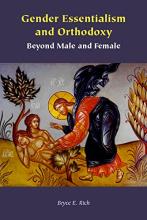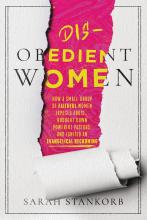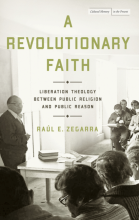Recent Books by Alumni
Do you have a recent book to add? Email Madison McClendon (mmcclendon @ uchicago.edu).
Michael Kinnamon (PhD'80, 2013 Alumnus of the Year): The Nominee: A Novel
Matthew McAvoy’s surprising nomination to lead his Christian denomination is, at first, exhilaration — the apex of a career in ministry, education, and leadership. Soon, though, that joy is undercut when a member of the church calls attention to Matthew’s support for persons who are gay or lesbian. What follows is an eight-month ordeal, challenging Matthew and providing new awareness of what the gospel demands. But when the opposition becomes a threat, the story takes a sinister turn that involves not only Matthew but his whole family–and raises even more questions about the meaning of leadership in our age. Inspired by the author’s own story, The Nominee shows that places we think are refuges can be the most dangerous.
Mun'im Sirry (PhD'12): Youth, Education, and Islamic Radicalism: Religious Intolerance in Contemporary Indonesia (University of Notre Dame Press, 2024) offers groundbreaking analysis of religious intolerance and radicalization among high school and university students in modern-day Indonesia. Sirry is an associate professor of theology at the University of Notre Dame and author of several books, including The Qur’an with Cross-References.
David Kwon (MDiv/MSW’10): Justice After War: Jus Post Bellum in the 21st Century is aimed especially to both undergraduate and graduate students, as well as the general audience who want to understand the significance of a recent development within the just war tradition, namely, the increasing attention given to the category of jus post bellum (postwar justice and peace). While examining the interrelated challenges of moral and social norms in both political and legal domains, as well as church practices, this work proposes an innovative methodology for linking theology, ethics, and social science so that the ideal and the real can inform each other in the ethics of war and peacebuilding. The main task of this project, then, is to identify what Kwon views as three key themes of jus post bellum, and three practices that are essential to implementing jus post bellum immediately after a war: just policing, just punishment, and just political participation.
Benjamin E. Sax (PhD’08): Winged Words: Benjamin, Rosenzweig, and the Life of Quotation This is the first book to explore the role of quotation in modern Jewish thought. Weaving back and forth from Benjamin to Rosenzweig, the book searches for the recovery of concealed and lost meaning in the community of letters, sacred scripture, the collecting of books, storytelling, and the life of liturgy. It also explores how the legacy of Goethe can be used to develop new strata of religious and Jewish thought. We learn how quotation is the binding tissue that links language and thought, modernity and tradition, religion and secularism as a way of being in the world.
Kenneth Atkinson (MDiv'94) has coedited and contributed to two recent works. Dr. Atkinson is Professor of History at the University of Northern Iowa.
Misusing Scripture: What are Evangelicals Doing with the Bible? offers a thorough and critical evaluation of American evangelical scholarship on the Bible. This strand of scholarship exerts enormous influence on the religious beliefs and practices, and even cultural and political perspectives, of millions of evangelical Christians in the United States and worldwide. The book brings together a diverse array of authors with expertise on the Bible, religion, history, and archaeology to critique the nature and growth of "faith-based" biblical scholarship.
Essays on the Psalms of Solomon: Its Cultural Background, Significance, and Interpretation. This volume examines the Psalms of Solomon, a collection of 18 psalms from the Second Temple period. Eleven articles in English and French offer new insights into the context, style, and reception history of these psalms, making this book an indispensable resource for anyone interested in Jewish and early Christian literature.
John Addison Dally (PhD’94) The Master Is Here: Stories Christian and Gay comprises a collection of short stories by author John Addison Dally. In this work of fiction, Dally weaves together the Christian and gay experience. With compelling characters and daring tales, Dally invites the reader to explore the complexities and conundrums of the human experience, with stories that chronicle the reckonings that none of us can avoid.
T. Patrick Hill (PhD'02): In No Place for Ethics: Judicial Review, Legal Positivism, and the Supreme Court of the United States, Hill argues that contemporary judicial review by the U.S. Supreme Court rests on its mistaken positivist understanding of law—law simply because so ordered—as something separate from ethics. Further, to assert any relation between the two is to contaminate both, either by turning law into an arm of ethics, or by making ethics an expression of law. This legal positivism was on full display recently when the Supreme Court declared that the CDC was acting unlawfully by extending the eviction moratorium to contain the spread of the Covid-19 Delta variant, something that, the Court admitted, was of indisputable benefit to the public. How mistaken, however, to think that acting for the good of the public is to act unlawfully when actually it is to act ethically and must therefore be lawful.
Kenneth Atkinson (MDiv'94) has coedited and contributed to two recent works: Misusing Scripture: What are Evangelicals Doing with the Bible? and Essays on the Psalms of Solomon: Its Cultural Background, Significance, and Interpretation. Dr. Atkinson is Professor of History at the University of Northern Iowa.
Computing and Technology Ethics
Emanuelle (Mandy) Burton (PhD'15) and Sara-Jo Swiatek (PhD'22) have published a textbook entitled: Computing and Technology Ethics: Engaging through Science Fiction. The book introduces the major ethical frameworks: deontology, utilitarianism, virtue ethics, communitarianism, and the modern responses of responsibility ethics, feminist ethics, and capability ethics. It then applies these frameworks to many of the modern issues arising in technology ethics including privacy, computing, and artificial intelligence. A corresponding anthology of science fiction brings these quandaries to life and challenges students to ask ethical questions of themselves and their work.
Gender Essentialism and Orthodoxy: Beyond Male and Female
From Bryce Rich (PhD’17). Within contemporary Orthodoxy, debates over sex and gender have become increasingly polemical over the past generation. Beginning with questions around women’s ordination, arguments have expanded to include feminism, sexual orientation, the sacrament of marriage, definitions of family, adoption of children, and care of transgender individuals. Preliminary responses to each of these topics are shaped by gender essentialism, the idea that male and female are ontologically fixed and incommensurate categories with different sets of characteristics and gifts for each sex. These categories, in turn, delineate gender roles in the family, the church, and society.
Gender Essentialism and Orthodoxy offers an immanent critique of gender essentialism in the stream of the contemporary Orthodox Church influenced by the “Paris School” of Russian émigré theologians and their heirs. It uses an interdisciplinary approach to bring into conversation patristic reflections on sex and gender, personalist theological anthropology, insights from gender and queer theory, and modern biological understandings of human sexual differentiation. Though these are seemingly unrelated discourses, Gender Essentialism and Orthodoxy reveals unexpected points of convergence, as each line of thought eschews a strict gender binary in favor of more open-ended possibilities.
Disobedient Women: How a Small Group of Faithful Women Exposed Abuse, Brought Down Powerful Pastors, and Ignited an Evangelical Reckoning
Sarah Stankorb (MA’05) outlines how access to the internet—its networks, freedom of expression, and resources—allowed women to begin dismantling
the false authority of evangelical communities that had long demanded their submission. Stankorb gives long-overdue recognition for these everyday women as leaders and as voices for a different sort of faith. Their work has driven journalists to help bring abuse stories to national attention. Stankorb weaves together the efforts of these courageous voices in order to present a full, layered portrait of the treatment of women and the fight for change within the modern American church.
A Revolutionary Feith: Liberation Theology Between Public Religion and Public Reason
In A Revolutionary Faith Raúl E. Zegarra (PhD’20) examines the process of articulation of religious beliefs and political concerns that takes place in religious organizing and activism, focusing on the example of Latin American liberation theology and the work of Peruvian theologian Gustavo Gutiérrez.


